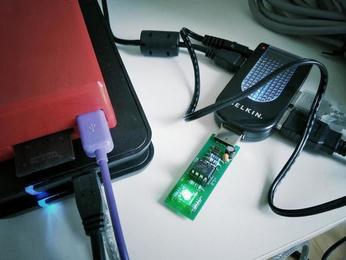Using BlinkStick with Raspberry Pi

Productivity Sauce
Hooking up LEDs to Raspberry Pi's GPIO pins and controlling them using Python scripts is a great and fun way to learn the ropes. For more advanced projects, you might want to consider investing in BlinkStick, an open source USB LED kit that works with Raspberry Pi, or any other machine for that matter. BlinkStick plugs directly into a USB port, which eliminates the need for a breadboard and wires and makes the setup more tidy. The accompanying software can control multiple BlinkSticks, which you can hook up to a USB hub. More importantly, BlinkStick supports a long list of options, and you can put it to a variety of practical and not-so-practical-but-fun uses.
To get started with BlinkStick on Raspberry Pi, you need to install the BlinkStick Python interface first. To do this, run the following commands:
sudo apt-get install python-dev python-pip sudo easy_install pip sudo pip install blinkstick
Run then the sudo blinkstick -h command. If everything works properly, you should see a list of all available options. By default, you have to execute blinkstick commands with root permissions. To fix that, run the following command and reboot Raspberry Pi:
sudo blinkstick --add-udev-rule
So what can you actually do with BlinkStick? For starters, you can use it to visualize CPU usage, and the blickstick command has a dedicated option for that. Run the blinkstick --cpu-usage command, and BlinkStick will change its color depending on the CPU usage (Green = 0%, Amber = 50%, Red = 100%).
Of course, you can put BlinkStick to other uses, too. I'm using BlinkStick with Pygmyfoto running on my Raspberry Pi. Every time someone visits the gallery, BlinkStick blinks with random color. This solution consists of a simple Bash shell script which controls BlinkStick and logs visitor access to the blinkstick.log file:
#!/bin/bash blinkstick --set-color random --blink --repeats 3 blinkstick --set-color random DATE=$(date "+%F %T") echo "Yay! Someone visited your site on" $DATE >> blinkstick.log
The shell_exec ( './blinkstick.sh > /dev/null 2>/dev/null &' ) command embedded into the index.php page triggers the script.
For further info on using BlinkStick and more ideas on how to use this nifty kit, visit the project's GitHub repository. In the meantime, drop by dmpop.dyndns.org/pygmyfoto/ and blink to me. :-)
comments powered by DisqusSubscribe to our Linux Newsletters
Find Linux and Open Source Jobs
Subscribe to our ADMIN Newsletters
Support Our Work
Linux Magazine content is made possible with support from readers like you. Please consider contributing when you’ve found an article to be beneficial.

News
-
Parrot OS Switches to KDE Plasma Desktop
Yet another distro is making the move to the KDE Plasma desktop.
-
TUXEDO Announces Gemini 17
TUXEDO Computers has released the fourth generation of its Gemini laptop with plenty of updates.
-
Two New Distros Adopt Enlightenment
MX Moksha and AV Linux 25 join ranks with Bodhi Linux and embrace the Enlightenment desktop.
-
Solus Linux 4.8 Removes Python 2
Solus Linux 4.8 has been released with the latest Linux kernel, updated desktops, and a key removal.
-
Zorin OS 18 Hits over a Million Downloads
If you doubt Linux isn't gaining popularity, you only have to look at Zorin OS's download numbers.
-
TUXEDO Computers Scraps Snapdragon X1E-Based Laptop
Due to issues with a Snapdragon CPU, TUXEDO Computers has cancelled its plans to release a laptop based on this elite hardware.
-
Debian Unleashes Debian Libre Live
Debian Libre Live keeps your machine free of proprietary software.
-
Valve Announces Pending Release of Steam Machine
Shout it to the heavens: Steam Machine, powered by Linux, is set to arrive in 2026.
-
Happy Birthday, ADMIN Magazine!
ADMIN is celebrating its 15th anniversary with issue #90.
-
Another Linux Malware Discovered
Russian hackers use Hyper-V to hide malware within Linux virtual machines.

